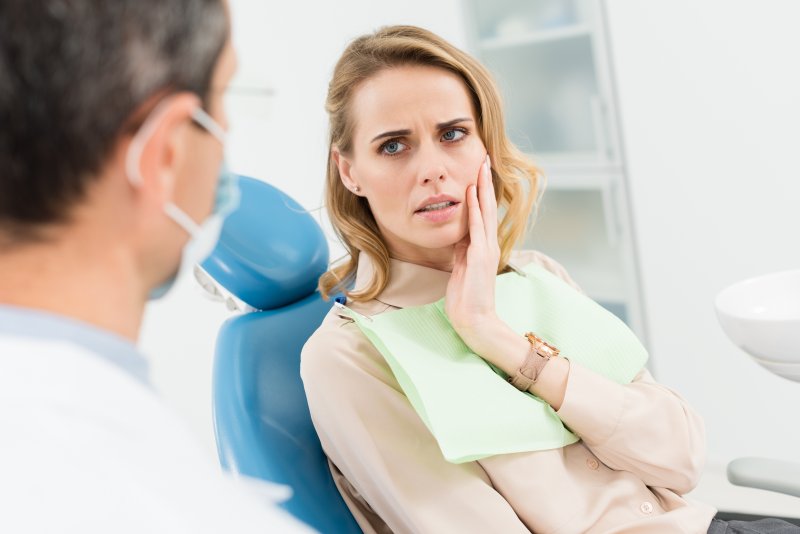
The holidays are a time for fun and excitement. No matter how you fill these special days or who you spend it with, it’s a great opportunity to make lasting memories. That is unless you fall victim to one of the following 4 dental emergencies. From skiing accidents to sugar-filled cavities and toothaches, there are plenty of ways pain and discomfort can derail your fun-filled occasions. To keep your mouth injury-free this year and continue enjoying the season, find out what you need to do to avoid dental emergencies around the holidays.
When Pain Strikes: Toothache
A toothache is one of the most annoying and irritating dental problems. Ranging from mild to severe, it can be difficult trying to determine the cause of your toothache. If you think something is lodged in-between your teeth, try using waxed dental floss to remove it. You might also try gargling with saltwater multiple times as well as applying an ice pack to reduce swelling.
Make sure to call your dentist to schedule an appointment, especially if the pain does not subside. After a thorough exam, they’ll be able to tell you the problem and how best to treat it. Unfortunately, toothaches aren’t always avoidable, but by continuing to practice good oral hygiene habits, avoiding hard, crunchy foods, and never using your teeth as tools, you can lessen the risk of developing a toothache.
The Sudden Gap: Knocked-Out Tooth
If you and your friends are enjoying time spent outside tubing on a large, snowy hill, it can be easy for spills and tumbles to occur, especially if it’s icy. Should you accidentally knock out a tooth, stay calm and retrieve it by the crown. If possible, try to reinsert it into the socket. If unsuccessful, place the tooth in a container of milk or next to your cheek in your mouth and get to your dentist’s office. If you want to save the tooth, you’ll need to seek treatment within an hour of the incident.
If you want to keep all your teeth intact this year, try wearing a mouthguard while playing outside. This will reduce the chances of a serious dental emergency should you experience a forceful impact.
Jagged Edges: Broken Tooth
When a tooth is broken, it’s likely you’ll begin to feel immediate pain. In order to lessen the discomfort you’re experiencing, try taking an over-the-counter pain reliever until you are able to get in to see your dentist. It’s important that you alert their office as soon as possible. If no pain is present but sharp edges exist, try using some dental wax or cement to cover the area, so you don’t accidentally scrape or cut your soft tissues on the rough parts of your broken tooth.
In addition to being careful while engaging in outdoor activities, try avoiding hard, crunchy foods, as this can be a culprit for broken teeth and result in an unexpected trip to the dentist’s office.
The Serious Threat: Infection
If you begin to notice a pimple-like bump on your gums and a tooth that is extremely painful and sensitive to the touch, you should seek immediate help. These are signs of a serious infection or abscess and if left untreated, it can begin to spread and affect other areas of your body, becoming very dangerous. Swelling around the cheek is likely to occur, so make sure you’re taking any medication that your dentist prescribes as instructed. Until you’re able to see them, use a store-bought pain reliever and a cold compress for 20 minutes at a time to reduce swelling and alleviate discomfort.
Preventing infections and other forms of dental emergencies can be as easy as maintaining a good oral hygiene routine. By brushing, flossing, and rinsing regularly, you can flush away harmful bacteria and food particles that, if left alone, can turn into tooth decay and gum disease.
Don’t let your holidays be ruined by sudden dental mishaps. Take the necessary precautions and strive to make this year’s festivities free of pain and injury and instead, full of laughter and fun.
About the Practice
Dental emergencies can happen at any time, which is why at Westgate Dental Care, we believe in helping you be better prepared when injuries occur. From toothaches to knocked-out teeth, we will not only be here to help you when you need it most, but we’ll also walk you through each step to take care of the situation at home until you can get in to see us. Contact us via our website or by calling (847) 577-7171 to learn more.
